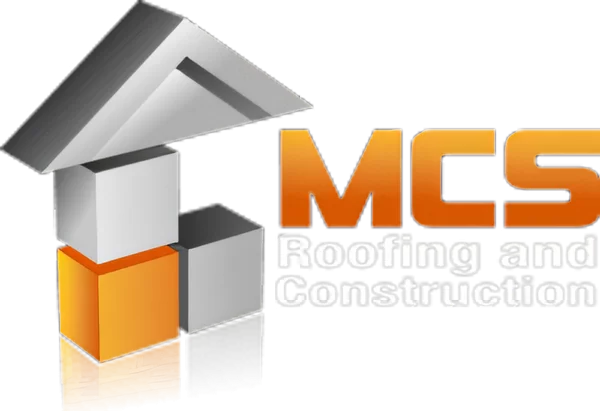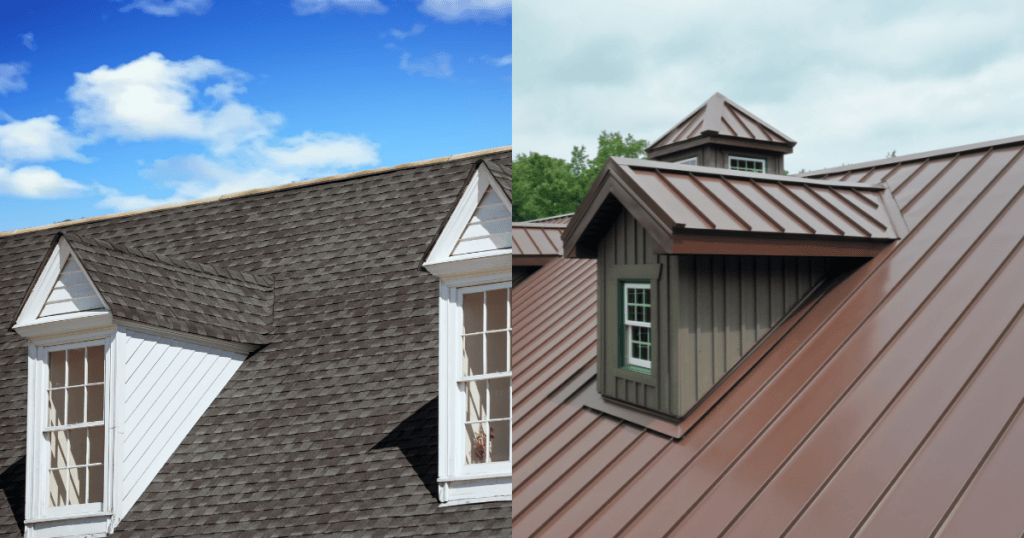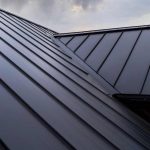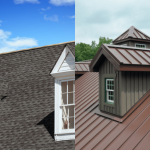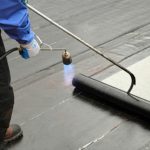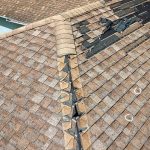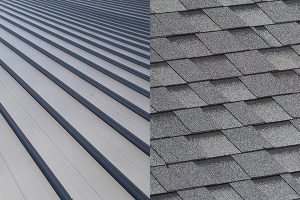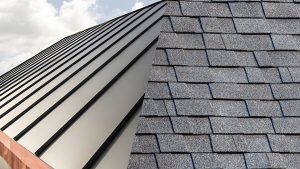Wondering which roof can actually save you money in the long run, metal roofs or shingles? Well, that’s quite a difficult choice because both options have great lifespan, appearance, and durability.
That’s the reason many homeowners get confused when it comes to protecting their homes. They couldn’t decide on the right choice and hence made comparisons to choose the best option.
If you are in a similar situation, this article can help you make an informed choice. Today, we are going to discuss metal vs. shingle roofing, which is best, which is more durable, which is aesthetically appealing, and what their pros and cons are, and much more.
Let’s break it down in detail so you can enhance the resale value of your home.
Metal Roofs and Shingles – What are They Exactly?
First things first. Before we dive deep into the comparative analysis, we need to discuss what metal and shingles are exactly.
Shingles:
Shingles are the most common roofing type in the US which are typically made from asphalt. They are usually installed in overlapping layers and come in 3-tab or architectural styles.
Metal Roofs:
Thanks to their durability and style, metal roofs are gaining popularity in the US. They are made from steel, aluminum, copper, or zinc. These roofing types can be installed in panels or shingles. Metal roofs are available in standing seam, corrugated, or stamped metal.
You May Also Like: Pros and Cons of Metal Roof – Should You Buy it?
Cost of Metal Roof Vs. Shingle
“Is a metal roof cheaper than shingles?” This is probably the first question that comes to every homeowner’s mind when it comes to replacing the roof.
Metal roof cost vs shingles should always be the top concern before deciding. According to an analysis, shingles are comparatively cheaper upfront. Their average cost is $5,000 – $10,000 for a standard-size home.
The materials are also affordable, and installation is faster (which means lower labor costs).
Metal roofs have higher upfront costs, which are around $10,000 – $20,000 depending on material and style. The labor is also more expensive since installation is more technical.
So, if you are thinking, ‘Are metal roofs more expensive than shingles’, then you are right. Though metal costs more, but saves money in the long run.
Shingles Vs. Metal Roofs – How Long Do They Last?
The roof is not just about today, it’s about the next few decades. So what is the best choice when it comes to their lifespan?
A shingles roof lasts 15-25 years, depending on quality and climate. However, they are prone to cracking, curling, or blowing off in storms. Remember, hot sun and heavy rain can speed up wear.
On the other hand, metal roofs last 40-70 years. They can easily withstand extreme weather conditions as well. Like shingles, they do not deteriorate under the sun or rain. So, metal wins the lifespan if you are really planning to stay in your home in the long run.
You May Also Like: Torch Down Roofing Guide – Benefits, Installation, Types, and Much More!
Metal Roof Versus Shingles – Which is Good in Appearance?
Shingles are more traditional and versatile. They are available in many colors and textures and easily blend well in neighborhoods where most homes have shingles. Plus, shingles are ideal for homeowners who want a “classic” look.
Metal roofs are sleek and modern. They can mimic shingles, wood shakes, or even slate. Metal roofs are available in bold colors and finishes. They are great for homeowners who want a standout or contemporary style.
Metal Roofing Vs. Shingle – Which is More Durable?
As mentioned above, shingles can crack in extreme heat. They can even blow off in high winds. Moreover, they are vulnerable to algae and mold in humid climates. Shingles also require regular maintenance and repair.
But on the other hand, metal roofing can resist cracking, shrinking, and erosion. These roofs can handle winds up to 140 mph (depending on installation). They also shed snow and rain more effectively. Another quality is, they are fire-resistant and safe in lightning-prone areas.
In a nutshell, metal roofs are more durable in extreme weather. Hence, they are great as compared to shingles that work well in mild or moderate climate zones.
Which is More Energy-Efficient? Metal or Shingles?
It’s not only about durability and appearance, but energy efficiency as well. Shingles can easily absorb more heat. This means they make your home hotter in summer.
There are more energy-efficient options, but they cost more.
Metal roofs reflect sunlight, keeping homes cooler. They can lower summer energy bills by 10-25%. Some roofs are designed with reflective coatings for maximum efficiency.
So metal is generally more energy-efficient, especially in sunny climates.
You May Also Like: 4 Popular Types of Metal Roofing
Which is Greener and More Environmentally-Friendly?
Shingles roofing is a petroleum-based product. They are quite difficult to recycle (many end up in landfills). And they also have a shorter lifespan, which means more waste.
However, metal roofs are made from 25–95% recycled materials. They are fully recyclable at the end of their life. This means, longer lifespan = less waste over time.
Noise Factor – Will Rain Keep You Awake?
Now here comes the noise factor. Which allows more noise into the room? Shingles are naturally quiet because of the layered asphalt. Rain or hail makes minimal noise.
But in the case of metal, they are louder without proper insulation. With underlayment, they’re nearly as quiet as shingles. However, modern installations solve most noise issues.
This means shingles are better as they don’t require any additional insulation.
Which Roofing Type is Easy to Install?
Shingles are easier and quicker to install. The best thing is, more contractors are familiar with shingles. Their repairs are also simple—replace a few shingles instead of large panels.
Metal roof installation takes more time and skill. There are just fewer contractors who can do it professionally. Their repairs are also more complicated.
This means shingles are more convenient to install and need less work.
You May Also Like: How Long Does a Composite Roof Last?
Pros and Cons of Metal Roof vs. Shingles
| Roof type | Pros | Cons |
| Metal roof | Last long
Highly durable Energy-efficient Eco-friendly |
Higher upfront costs
Louder without insulation Requires specialized installation |
| Shingle roofing | Affordable
Easy to install Classic and elegant look |
Shorter lifespan
Higher maintenance Less durable in extreme weather |
So, Which Should You Choose? MCS Roofing’s Recommendation
After this detailed analysis, we really hope that now you can decide between these two options. If you are still not sure, just analyze your goals once again.
If you want affordability, easy installation, and a traditional look. We’d recommend shingles.
If you want longevity, durability, energy savings, and eco-friendliness. We’d recommend metal roofing, which might be worth the investment.
Final Thoughts
Your roof is more than just protection—it’s a long-term investment in your home. Shingles give you affordability and familiarity, while metal roofs offer unmatched durability and style.
Here’s the golden rule:
- If you are looking for a more budget-friendly option, shingles make sense.
- If you’re in your forever home and want fewer headaches down the road, metal is the way to go.
Whichever option you choose, make sure you trust qualified contractors. MCS Roofing is a reliable local company that has the expertise to handle both shingle and metal roof projects, helping you make the right choice for your home while guaranteeing professional results that last. Whether you choose metal roofing or go for shingles, you are just one call away from a fully protective and durable roof.
You May Also Like: Can Roofers Work in Rain or Not?
